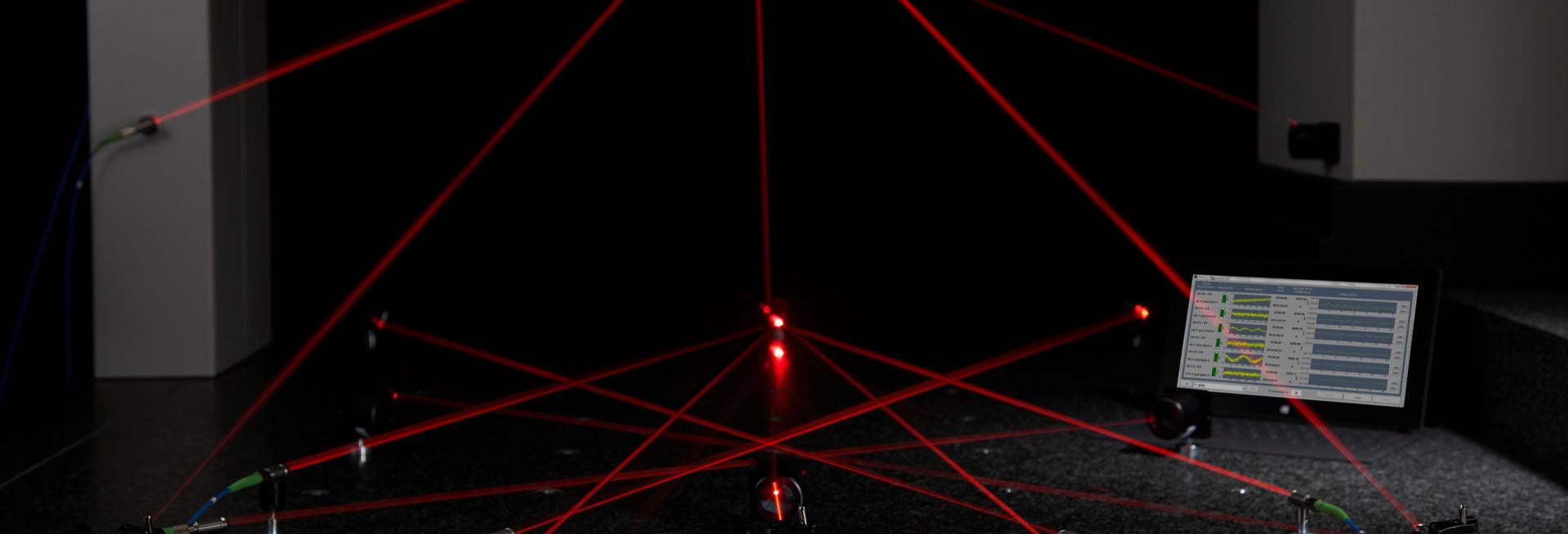From particle colliders to high value manufacturing...
In most everyday situations distances do not need to be measured with great accuracy – but it is a different story when it comes to engineering. High-precision machines and equipment such as particle accelerators simply will not work unless their components are positioned to an incredibly high level of accuracy, often to a few microns (thousandths of a millimetre) in every hundred metres.
Revolutionary technique
For the operation of the ATLAS detector at CERN’s Large Hadron Collider and the design and construction of the next generation of linear particle accelerators, Professor Reichold devised an sophisticated laser-based measurement system. It uses frequency scanning interferometry (FSI) technology developed in Oxford, a revolutionary technique which is capable of cost effectively measuring large absolute distances very accurately, with a tolerated error of only half a micron per metre. This is roughly equivalent to the width of a human hair over a kilometre – an astonishing degree of accuracy over such a distance.
Foreseeing a wide range of potential applications of FSI beyond particle detectors and accelerators, Professor Reichold approached Etalon Products GmbH, a German high-tech company, since he was aware they had several potential commercial uses for the technology. Etalon at this time manufactured laser tracers to measure distances with extreme accuracy, and the technique that Professor Reichold had developed for particle accelerator construction had the potential to improve their performance significantly.
Patented technology
Through a collaborative research project, Professor Reichold and Etalon worked together to see how the fundamental science could be applied to multiple commercial problems. The technique was patented by Oxford University Innovation (OUI) and licensed to Etalon, who now manufacture and sell the technology under the brand name Absolute Multiline which can now measure many absolute distances simultaneously.
Thanks to the collaboration, FSI technology is now used in a wide variety of applications beyond physics experiments, such as calibration of co-ordinate measuring machines (CMM), power production plants, precision mirror manufacturing, Telescope alignment and material research laboratories. It is also on its way into space simulators, aircraft manufacturing, national metrology institutes and many other applications.
Collaboration and evolution
At the same time, new research projects have emerged which require FSI, including a proposed future linear particle accelerator, the International Linear Collider. As Professor Reichold’s research continues, ideas are continuously exchanged to further improve the technology for commercial applications, through Etalon and also through a new industrial collaboration with VadaTech UK. The European National Metrology Institutes have identified FSI as one of the most important themes for Europe’s future Large Volume Metrology (LVM), because of its ability to measure the size, location, orientation and shape of large objects, assemblies or machine tools.
Professor Reichold’s team is currently working on adapting the technology to be able to measure distances to fast-moving targets, which will open up yet another market: control of high-precision Computer Numerically Controlled (CNC) machine tools.
‘The Absolute Multiline Technology provides the foundation for machines and structures that are self-monitoring. Therefore, it can become a building block in the future concept of intelligent production.’
Dr.-Ing. Heinrich Schwenke, CEO Etalon AG

